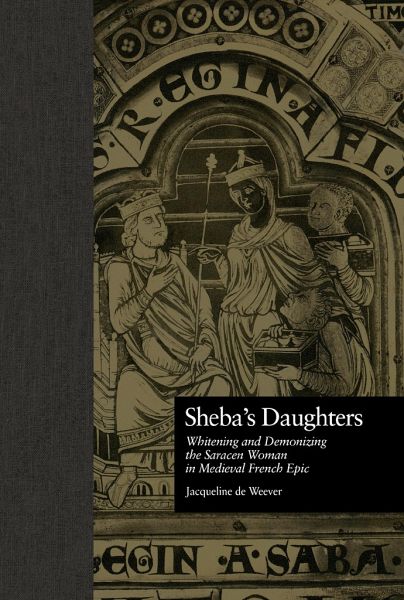
Sheba's Daughters
Whitening and Demonizing the Saracen Woman in Medieval French Epic
Versandkostenfrei!
Versandfertig in 1-2 Wochen
167,99 €
inkl. MwSt.
Weitere Ausgaben:

PAYBACK Punkte
84 °P sammeln!
The Saracens were the "black devils" of medieval epics and romances, and medieval biblical exegesis and critical canons made it clear that the color black always had only the most negative connotations. However, the daughters of these "black devils" were usually described as beautiful white maidens who married the white Christian knight at the conclusion of these same epics and romances. This self-contradictory presentation is addressed in this ground-breaking and exhaustive study of the problem of poetic representation of a "black" heroine as white and the resulting chaos when language proves...
The Saracens were the "black devils" of medieval epics and romances, and medieval biblical exegesis and critical canons made it clear that the color black always had only the most negative connotations. However, the daughters of these "black devils" were usually described as beautiful white maidens who married the white Christian knight at the conclusion of these same epics and romances. This self-contradictory presentation is addressed in this ground-breaking and exhaustive study of the problem of poetic representation of a "black" heroine as white and the resulting chaos when language proves inadequate to support such representation. Exploring how the depiction of otherness or alterity during the Middle Ages became problematic in the aesthetics of the Romance epics written during the centuries of the Crusades, this book offers a vital contribution to the growing interest in the way foreign women are presented in the texts of the Latin West and will be of consuming interest to students in women's studies, cultural studies, and medieval literature. The texts considered are written in the major European languages of the time and range from the "Song of Songs through Geoffrey of Vinsauf's "Poetria Nova to such epics and romances as "Erec et Enide, Doon de Maience, Fierabras, La Prise d'Orange, Ars Versificatoria, The Sowdone of Babylone, and Parzifal. Excerpts from the texts discussed are provided in the original language and English translation in an Appendix. A bibliography of primary and secondary sources leads readers to all material relevant to further study of the subject.













